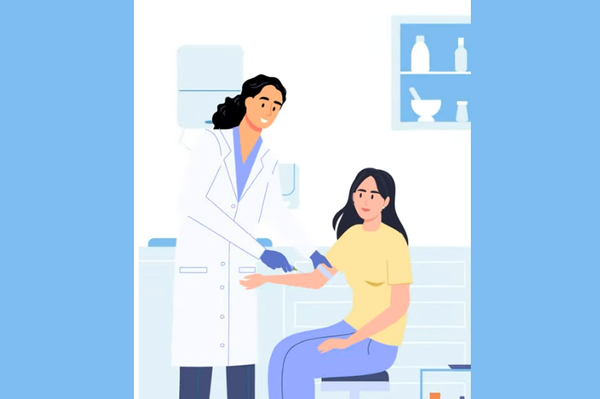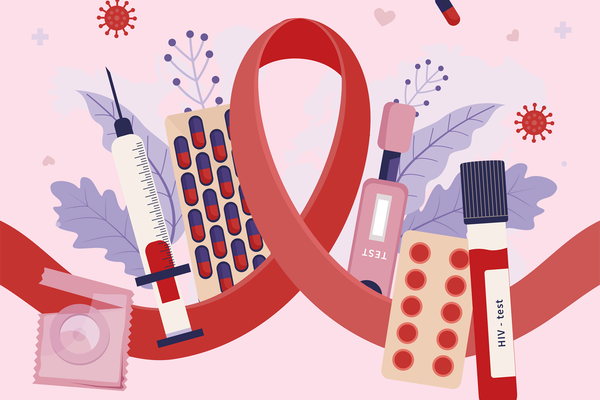When Vickie Lynn learned she was HIV positive in 1991 at the age of 21, she thought she’d been given a death sentence. She certainly never imagined she’d live long enough to see a milestone that affects women later in life — menopause.
Now 57 years old and solidly postmenopausal, Lynn still remembers how hard it was to find a healthcare provider (HCP) who would take her menopause symptoms seriously.
“I was having symptoms that nobody really understood, or they didn't connect them to menopause,” Lynn said.
Dealing with the stress of working on her doctorate degree during perimenopause didn’t help the situation, and Lynn herself struggled to pinpoint the cause of her symptoms.
“Is it the HIV, the menopause or the Ph.D.? There was a lot going on, and nobody could give me any straight answers,” Lynn said. “It was a very difficult time.”
Thanks to a type of treatment called antiretroviral therapy (ART), more people are living longer lives with HIV. Almost half of those with HIV in the United States are 50 or older.
For women, aging with HIV may pose unique health challenges, including during the menopausal transition. And a lack of research on how menopause affects women living with HIV — coupled with a shortage of providers who understand how best to treat these women — may make it hard for menopausal women living with HIV to find the support and care they need.
Watch “The 3 Stages of Menopause” >>
When does menopause start, and why does it matter?
For women living with HIV, it can be tricky to tell when menopause begins. This is because many women with HIV have abnormal periods related to medical conditions associated with HIV, said Sara Looby, Ph.D., ANP-BC, a researcher at Massachusetts General Hospital in Boston and an assistant professor of medicine at Harvard Medical School.
“It's really important for clinicians to not assume that it's true menopause when missed periods occur,” Looby said. “They should also assess other factors besides menopause — including psychosocial, behavioral and physical health changes — that women living with HIV might be experiencing that could lead to missed periods.”
That said, some research suggests that women with HIV start menopause three to five years sooner than other women. This is worth noting because the earlier a woman goes through menopause, the earlier she starts to lose the protective effects of estrogen against heart disease, mood changes, bone loss and other health issues. Since women with HIV are already more likely to experience these issues, menopause can make them extra vulnerable.
Researchers have also found that the drop in estrogen that happens during menopause may affect a woman’s CD4 cell count. CD4 cells are white blood cells that play an important role in immune health, and your CD4 cell count is a good indicator of how well your immune system is functioning. The lower your number of CD4 cells, the weaker your immune system, and the greater your risk of developing serious illnesses.
Living with HIV may mean worse menopause symptoms
Not only might women with HIV start menopause sooner compared to other women, but their symptoms may be worse. “There have been conflicting results, but there are many studies to date that suggest that women with HIV may experience more frequent and severe hot flashes compared to women without HIV,” Looby said.
Looby was involved in research on the topic: She and a team of researchers did a study involving 33 women with HIV and 33 without HIV who were similar in age, race and menstrual patterns. They found that the women with HIV had worse hot flashes and that these hot flashes were more likely to disrupt their lives.
Another study found that menopausal symptoms potentially affect a patient’s ability to take antiretroviral therapy (ART) as prescribed. And a third study looked at 714 women in Nigeria with and without HIV and found that menopause symptoms were generally worse in the women living with HIV and that these women were three times more likely to have severe symptoms.
Finding care can be a challenge
As hard as it may be for women to handle the dual challenges of HIV and menopause, it may be even harder to find help.
Even HCPs who specialize in menopause may lack experience when it comes to treating women living with HIV, and not many HIV specialists are also experts on menopause.
“For women in the United States who have lived with HIV for a long time — their primary care doctor is often an infectious disease provider,” Looby said. “These providers are phenomenal at managing their patients’ HIV and many aspects of their primary care, though many are not necessarily trained to assess, diagnose and treat menopause.”
Providers who do treat menopausal women living with HIV may be reluctant to prescribe treatments such as hormone therapy (HT) — also known as hormone replacement therapy or HRT — because they’re worried about drug interactions and other issues, and patients may be reluctant to take them. In one study of more than 800 menopausal women living with HIV, only 8 out of 100 said they used HT during the transition.
This is true in spite of the fact that, under the right circumstances, HT may help some women living with HIV manage menopause symptoms and improve their quality of life.
“I think there's a lot of fear in prescribing menopausal hormone replacement therapy to special populations, including women with HIV, because there is a lack of data showing safety and efficacy in this population,” Looby said. “More research and education on both menopause and hormone therapy are needed for women with HIV and their providers to help support shared decision-making.”
Looby also noted that HCPs for women with HIV should carefully consider an individual’s health risk factors along with existing guidelines for menopausal hormone use in women without HIV. This careful consideration plays an important role in helping patients and their providers make informed decisions together.
Information is key to coping with menopause when you have HIV
When Lynn was menopausal and trying to understand what was happening to her body, she was discouraged by the general lack of information about HIV and menopause.
“Not even being able to find any research literature on what I was going through was very frustrating for me,” Lynn said.
So where should women living with HIV turn for help navigating the twists and turns of menopause? Lynn, a public health and social work professional who has spent the past three decades advocating for HIV issues, suggests reaching out to organizations, such as The Well Project, that can provide information as well as connections to other people who understand what they’re going through.
“I wish that every community-based organization that serves people living with HIV had a specialist on menopause or aging,” Lynn said. “There's so many of us that are aging, and so little is known. We're still learning.”
This resource was created with support from Gilead.
- Growing Older with HIV ›
- HIV, Aging and Whole Person Care ›
- PrEP and PEP: Prevention for HIV ›
- Your Guide to HIV & Aging ›
- HIV and Older Women ›
- Women Can Get HIV. That’s Why They Need HIV Testing. - HealthyWomen ›
- Ask the Expert: HIV and Aging - HealthyWomen ›
- What No One Tells You About Menopause - HealthyWomen ›
- Connection Between HIV and Mental Health - HealthyWomen ›





